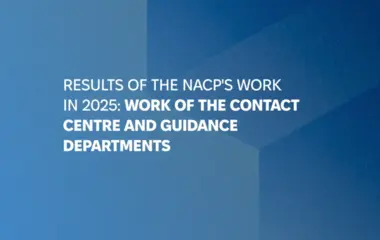The National Agency on Corruption Prevention (NACP) has repeatedly emphasized the necessity of conducting an independent audit of its activities, as this is an effective instrument for enhancing institutional performance, ensuring transparency, and producing a comprehensive strategic document that will contribute to the institution’s sustainable development.
In accordance with the Law of Ukraine “On Prevention of Corruption” (the Law), an independent external evaluation of the NACP’s activities must be conducted every two years. The report on the first external independent assessment of the NACP for 2020–2021 was published by the Cabinet of Ministers in July 2023. The Agency is currently prepared to report to the auditors on the implementation of the recommendations of the first report and remains open to conducting the next evaluation as required by the Law.
On 4 November 2025, the European Commission published the Report on Ukraine’s progress within the 2025 EU Enlargement Package, which contains a detailed assessment of Ukraine’s progress toward EU membership and key recommendations for further advancement.
The Commission emphasized the need to evaluate the effectiveness of the NACP using a credible methodology and criteria. The Agency fully supports this requirement and, earlier this year, submitted substantiated proposals to the Ministry of Justice of Ukraine regarding future evaluation criteria and methodology.
In addition, at the initiative of Members of Parliament, on 13 November 2025, a Draft Law was registered proposing amendments to the Law of Ukraine “On Prevention of Corruption” to ensure the external independent evaluation of the NACP’s effectiveness. The draft provides for the approval of the evaluation criteria and methodology by the Commission responsible for conducting the assessment and establishes the timelines for its implementation.
The Agency stresses that the external audit must be conducted to assess its effectiveness, identify problems and potential areas for improvement, and must not be used in any way as an instrument of potential influence on the institution’s independence.
Taking into account the recommendations of the European Commission, the NACP expresses its readiness to participate in refining the Agency’s evaluation criteria and calls on the public, international partners, and experts in the field to contribute to the discussion. The NACP consistently maintains that only a transparent and inclusive approach can ensure the adoption of the most effective decisions.
The European Commission’s report also stated that the Agency must immediately implement the outstanding recommendations of the report published in July 2023.
Based on the results of a comprehensive analysis, it has been determined that the NACP has met the vast majority of effectiveness criteria. This was the first external audit of the NACP, an anti-corruption body, in the history of independent Ukraine.
Currently, the total number of implemented or partially implemented recommendations stands at 102 (89.5%). Fifty recommendations (43.9%) have been implemented and are in effect on a permanent basis; these relate to the approval of various procedures and methodologies across multiple areas of activity.
However, four recommendations do not fall within the NACP’s mandate and fall under the competence of the Verkhovna Rada of Ukraine. Two additional recommendations cannot be implemented due to the existing legal prohibition on conducting competitive procedures for filling civil service vacancies during martial law.
More than 20 recommendations have been implemented during the tenure of the Head of the NACP since February 2024. In particular, these include measures of financial control regarding special categories of declarants carried out by a dedicated unit; an increase in the staffing levels of the anti-corruption policy department; the introduction of a comprehensive internal audit process; the establishment of an audit sector; the creation of an Audit Committee; the approval of the Procedure for drawing up protocols on administrative offenses within the NACP; support for the process of establishing NACP’s territorial bodies; the restoration of the section on NACP performance results on the official website; and the restoration of openness and public access to the Unified state register of political parties’ reports on property, income, expenditures, and financial liabilities (POLITDATA).









